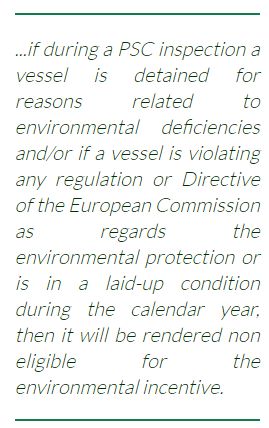
The Cyprus Shipping Deputy Ministry recently announced a new 'Green Incentives Programme', aiming to reward vessels which effectively reduce their greenhouse gas emissions.
These measures form part of the general efforts of the Shipping Deputy Ministry – in line also with the European Green Deal – for promoting sustainable shipping practices which will bring the industry one step closer to the green transformation. The European Commission's Green Deal encompasses a series of policy initiatives aimed at achieving climate neutrality for the European Union by 2050.
As from January 2024, shipowners of Cyprus and Community ships will be eligible to receive up to a 30% reduction in annual tonnage tax, for each vessel that shows proactive measures in minimizing their environmental footprint, thereby incentivizing sustainable shipping practices.
The benefit of the reduced tonnage tax will be available only to owners of Cyprus and Community ships, if they comply with the following prerequisites of the environmental incentives, as these were stated in the relevant announcement of the Shipping Deputy Ministry:
- EEXI – ships that have achieved reduction of their Attained Energy Efficiency Existing Ship Index (EEXI) in comparison to the Required EEXI (Regulations 19, 23 and 25 / amended MARPOL ANNEX VI) by more than 10%, will obtain the respective annual tonnage tax reduction of between 5 – 25%.
- IMO DCS – the environmental incentive relating to the IMO Data Collection System (DCS) applies to ships of 5.000 GT and above with the reported hours underway of 4.380 and above for each year, that comply with Regulation 27 of amended MARPOL ANNEX VI. Ships which demonstrate reduction of the total fuel oil consumption to the total distance travelled, between two consecutive reference periods (year x vs year x-1) of more than 4%, will obtain an annual tonnage tax reduction of between 10 – 20%.
- CII – the environmental Incentive relates to the Carbon Intensity Index (CII) of the IMO and applies to ships of 5.000 GT and above (Regulation 28 / amended MARPOL ANNEX VI). Ships that achieve an operational carbon intensity of Rating A or Rating B in a year, with declared hours underway of at least 4.380 per year, will obtain an annual tonnage tax reduction of 20% for Rating A or 10% for Rating B.
It should be noted that if during a PSC inspection a vessel is detained for reasons related to environmental deficiencies and/or if a vessel is violating any regulation or Directive of the European Commission as regards the environmental protection or is in a laid-up condition during the calendar year, then it will be rendered non eligible for the environmental incentive.
Moreover, according to the Shipping Deputy Ministry's announcement on the matter, comprehensive and varied actions are necessary on both global and regional scale to meet emissions reduction goals and secure a sustainable future for the industry. This encompasses the use of cleaner fuels, the establishment of the necessary infrastructure, the electrification of ships and the implementation of energy efficiency technologies. A combination of these strategies has the potential to enhance both the commercial and environmental sustainability of the sector, while also incentivising shipowners to invest in sustainable practices.
In conclusion, it is evident that the support of sustainable shipping and the environmental responsibility are at the core of the national maritime policy. The new set of measures certainly reflect the commitment of Cyprus to the green transformation of the sector and further reinforce the island's reputation not only as a pivotal maritime state but also as an advocate for system – wide collaboration to this challenging task of transitioning to a decarbonised shipping industry.
The content of this article is intended to provide a general guide to the subject matter. Specialist advice should be sought about your specific circumstances.


